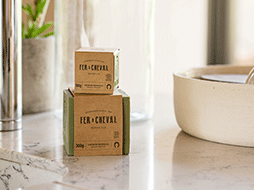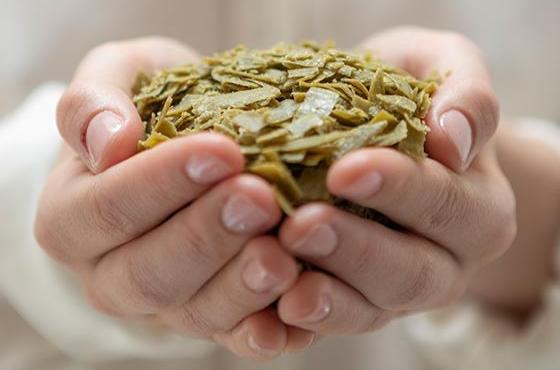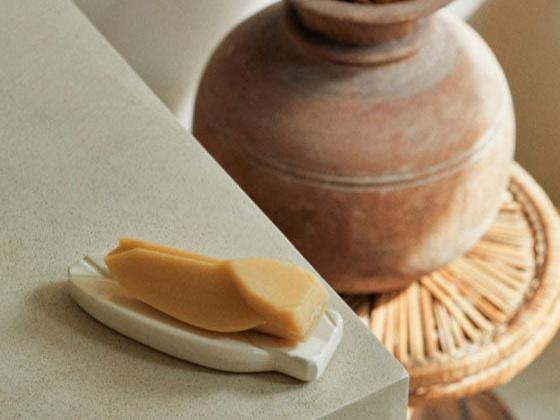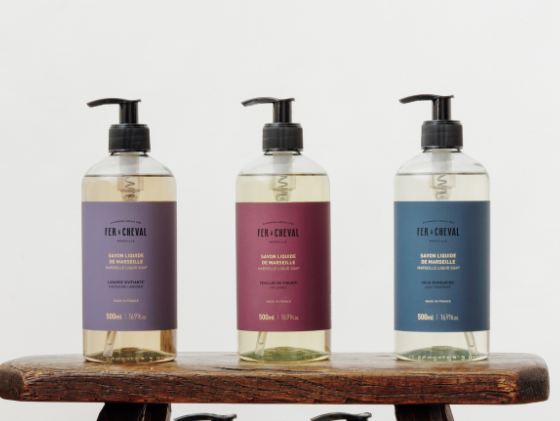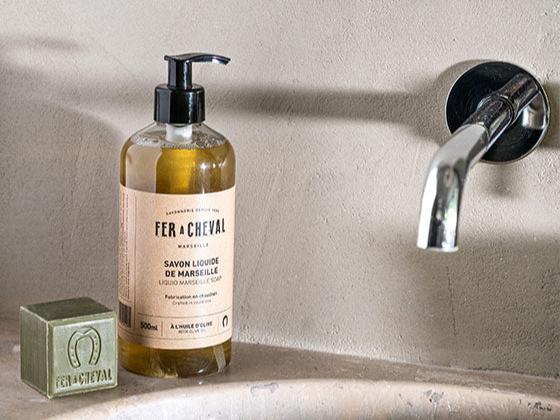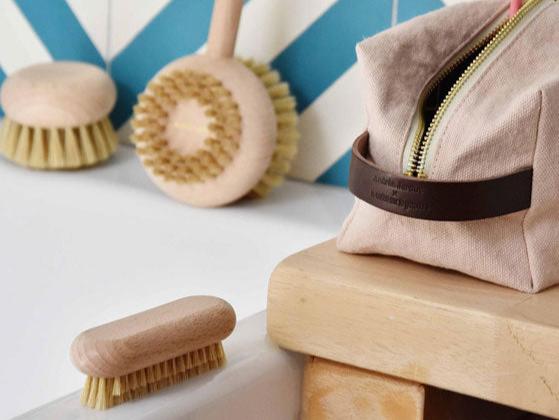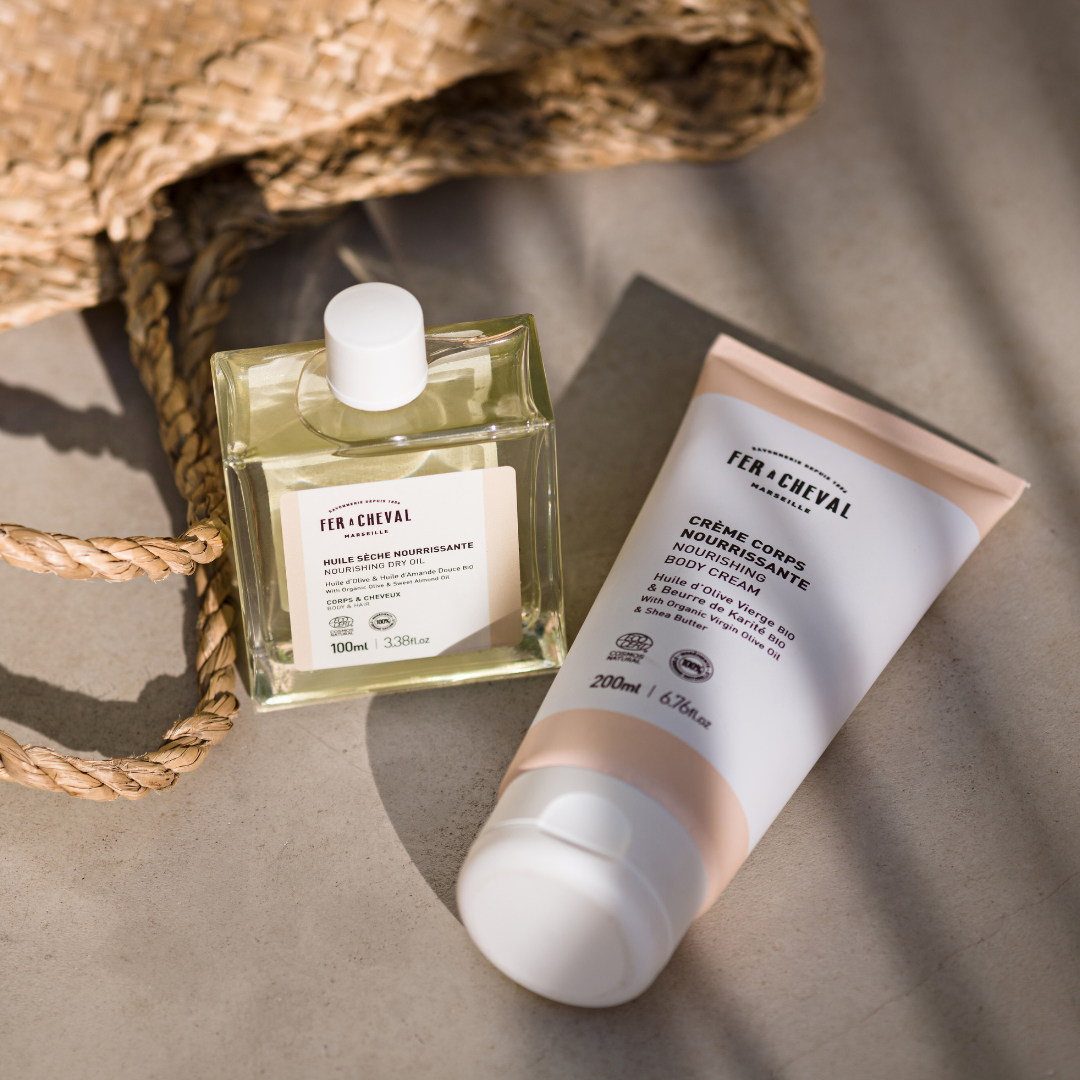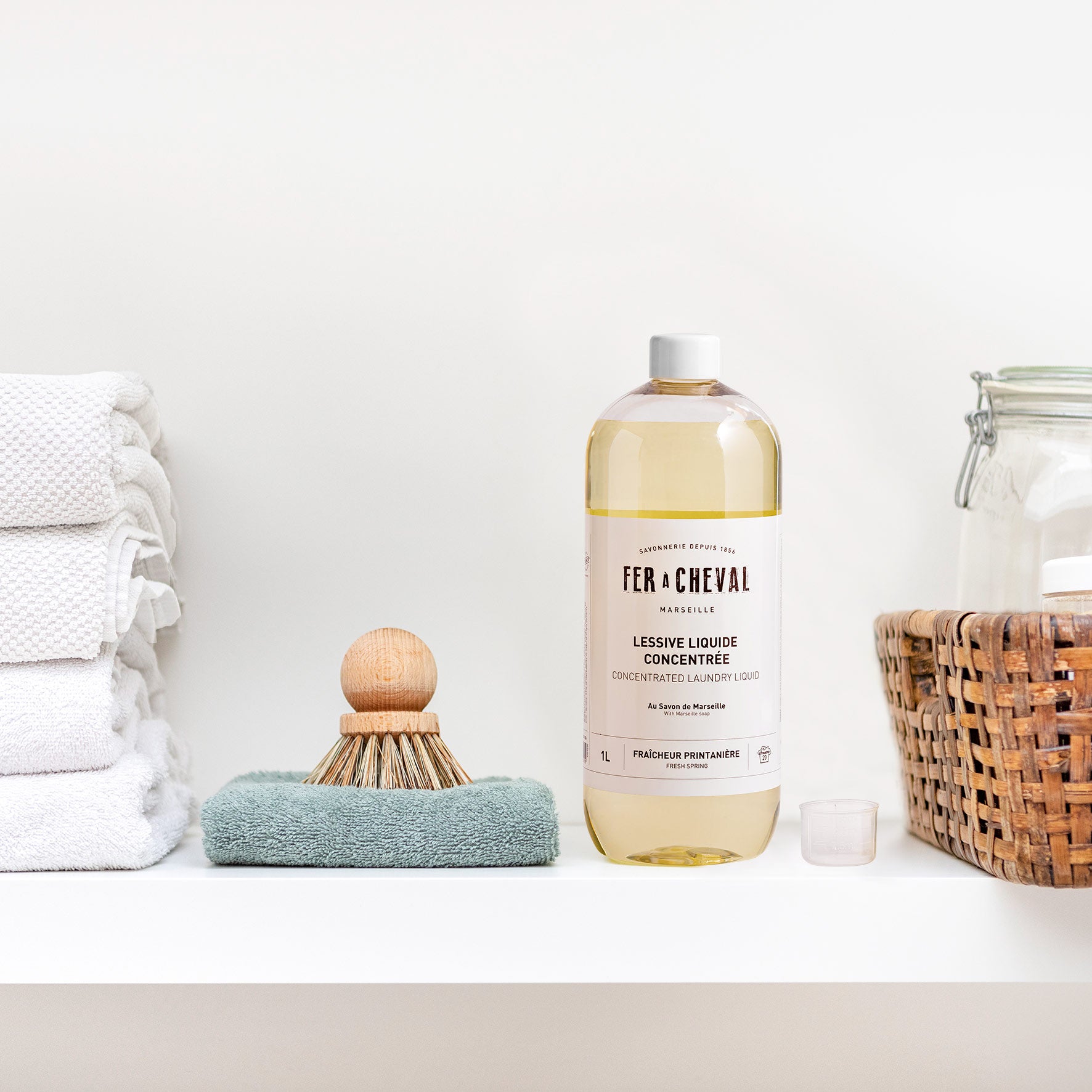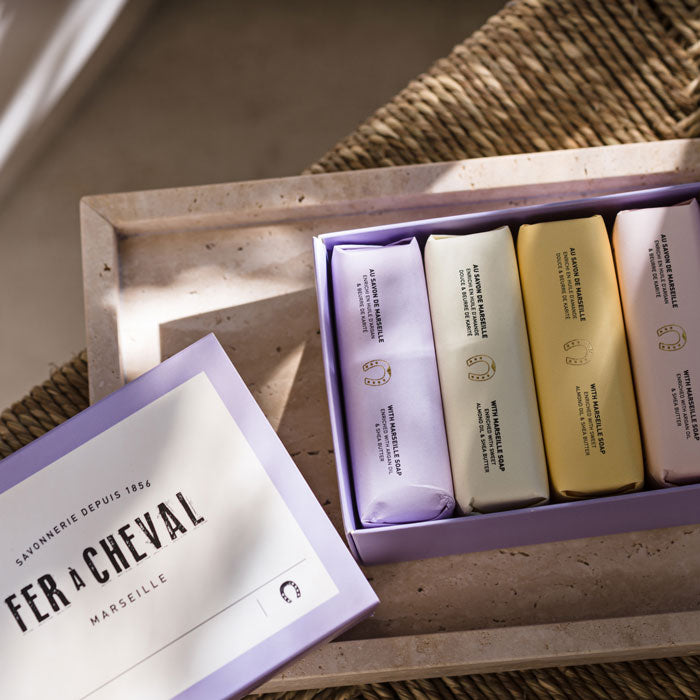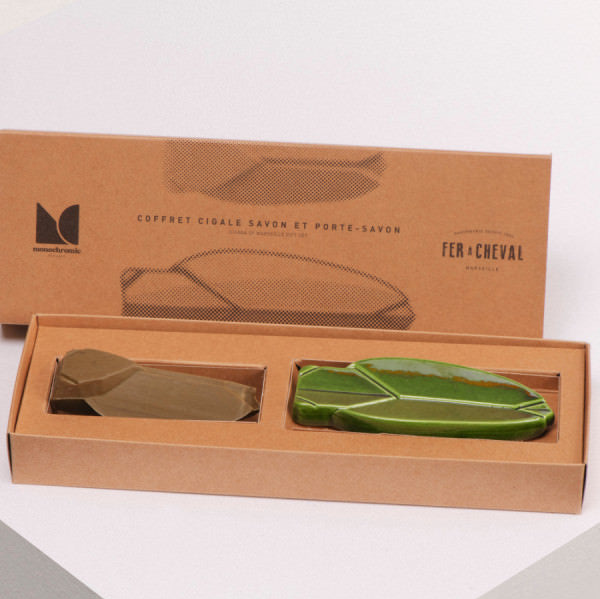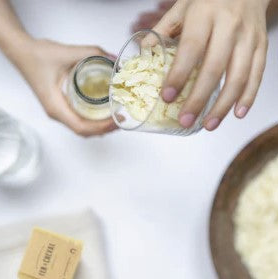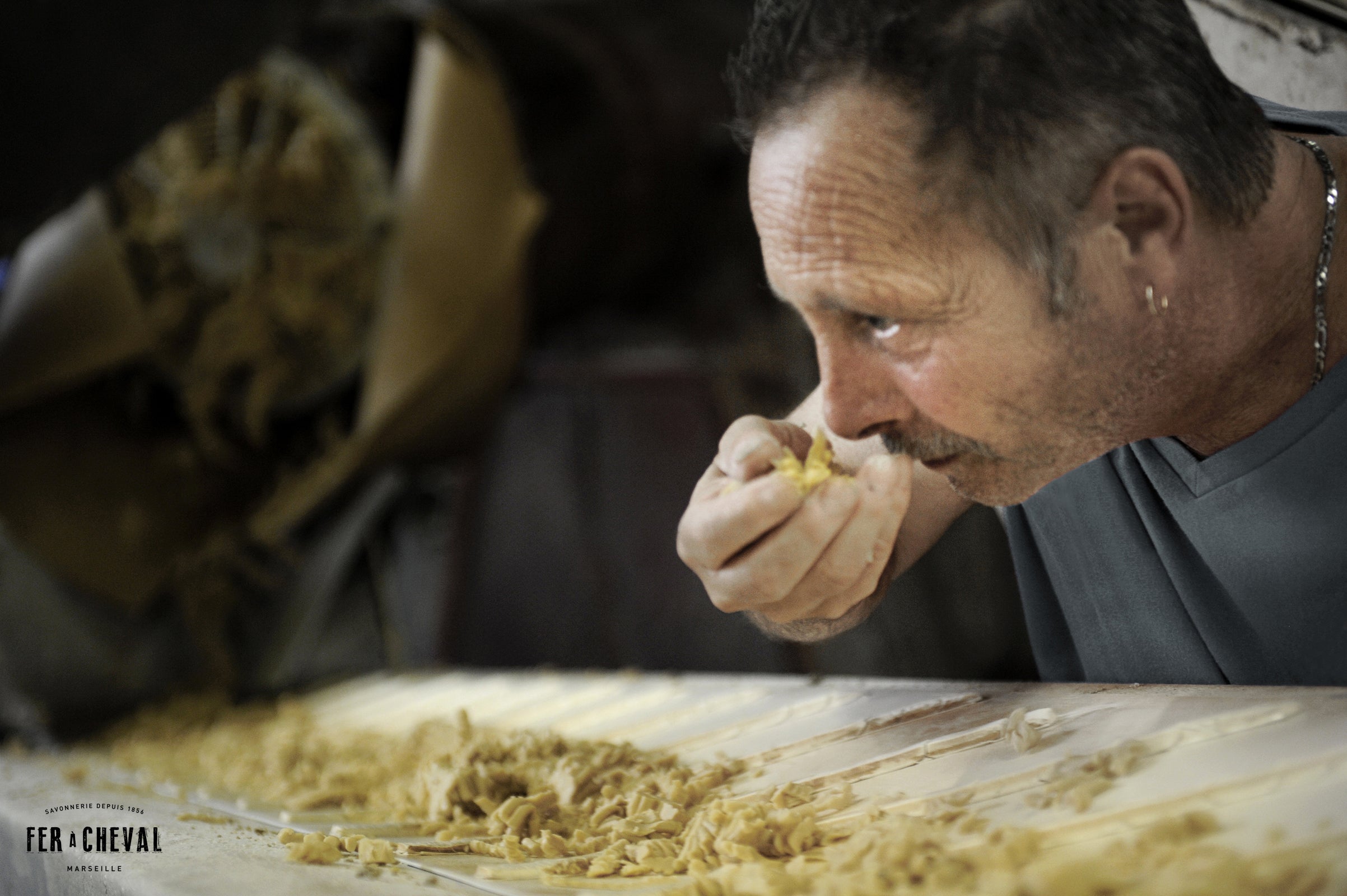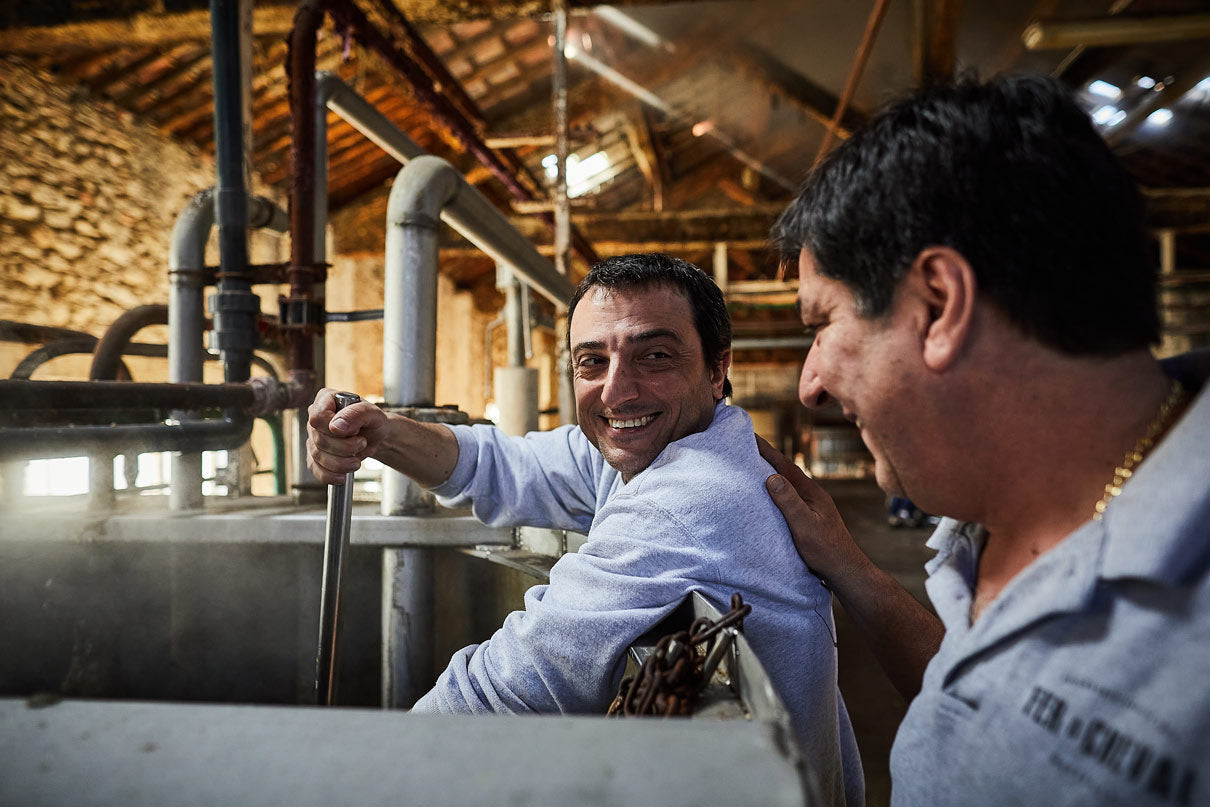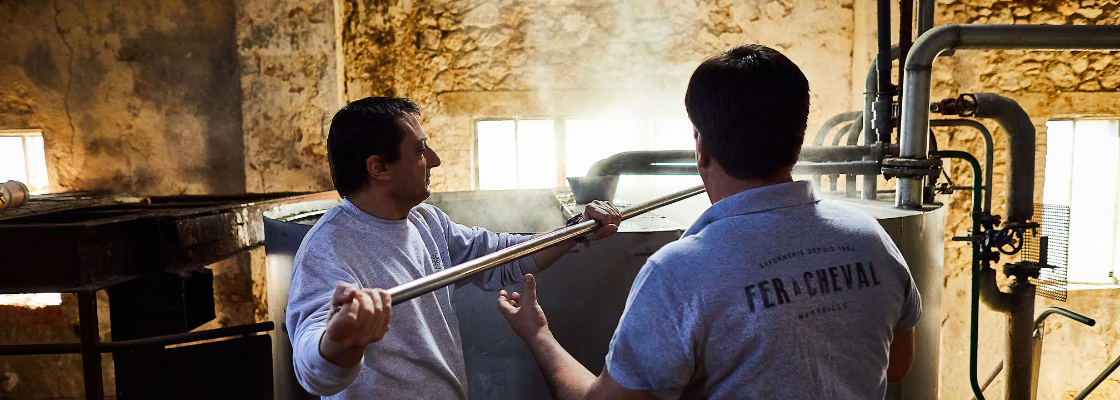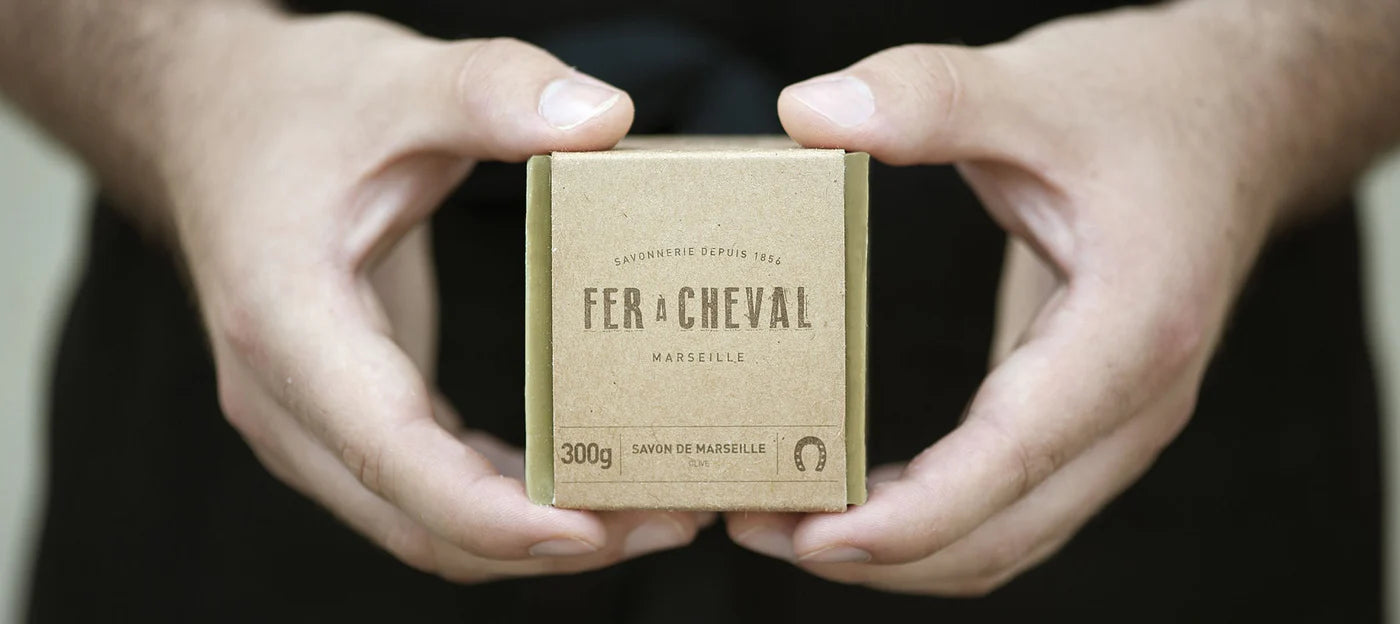
Our FAQ gathers all the questions about the most frequently asked products.
Frequently Asked Questions
Marseille Soap
A traditional Marseille Soap is:
- a soap made exclusively from Vegetable oils, without chemical additives, preservatives, colorings or perfumes
- manufacture in cauldrons according to the Marseille Soap saponification process
- a geographical origin: the Marseille region
There are two types of Marseille Soaps: green Marseille Soap and beige Marseille Soap. They are both saponified using the same process in cauldrons according to the traditional recipe. The difference between the two lies in their Vegetable oil composition.
The green soap is obtained from 100% olive pomace oil, known for its nourishing properties.
The beige Soap is obtained from 20% RSPO palm kernel oil and 80% RSPO palm oil, which have been used for more than 200 years and imported at the time via the French colonies. They improve the solid consistency of the soap for more practical use.
Both soaps (green and beige) are recommended for both personal hygiene and household maintenance (floors, etc.).
This formula is unique on the market and consists solely of olive pomace oil.
Meeting the requirements of the Colbert Edict of 1688, this traditional formula guarantees the detergent and cosmetic properties of Marseille Soap.
Multi-purpose, it is recommended for washing your hands, removing stains from clothes, making laundry detergent or washing surfaces.
Please note that we pay very close attention to our choice of Vegetable oils to offer you a Marseille Soap of excellent quality. We have been following the same manufacturing process and using the same varieties of oils for more than two centuries, which is what makes our Marseille Soap authentic, sought after and appreciated for generations. Our oils come from the Mediterranean region for olive oil (Greece, Spain, Italy, and Morocco), and mainly from South-East Asia (Philippines, Malaysia among others) but also from Latin America (Colombia, Honduras among others) for copra, palm kernel and palm oils (RSPO certified).
The Soap consists of a minimum of 72% active ingredients made from oil or oil extracts and a maximum of 28% water. The 72% oil mention is written on the sleeve of our Soaps on the upper side.
Olive Marseille Soaps have a rather particular smell. Soap factories have always used olive pomace oil, which comes from a second pressing of the olives; the first pressing is used to supply the food industry. This oil gives Marseille Soap its characteristic smell.
This smell also depends on the percentage of olive pomace oil present in the Soap. The higher the percentage, the stronger the smell. In addition, the fresher the Soap, the stronger the smell.
Our Vegetable palm oil Marseille soaps do not have this specific odor.
Our Marseille Soaps have a pH of approximately 10, which differs from neutral pH soaps closer to pH 7. Generally, neutral pH soaps are formulated without a washing base, and often contain many preservatives and other synthetic products. Our Marseille Soaps, on the contrary, have a higher pH and are known for their hyper-washing properties.
Moreover, made exclusively with 100% Natural Vegetable oils, our soaps are extra pure and hypoallergenic because they contain no preservatives, perfumes, colorings or other synthetic products.
Marseille Soap is a living material with a unique color and shape that may vary over time, and depending on its exposure to air and light. Nevertheless, it will retain all its qualities and effectiveness. Our grandmothers used to let it dry for many months in their cupboards so that it would become extra dry and last longer in use. The Soap is made up of active ingredients manufactured from oils or oil extracts and a maximum of 28% water.
By losing this water, they lose part of their weight. This is why we mention “Net weight at packaging” on the packaging. Our quality department ensures that the grammage is respected at the end of production.
The Stain Remover Soap is made from recycled Soap scraps and ends of cauldrons of Marseille Soap with olive oil or palm oil that we recover.
The composition is the same as any Marseille Soap, meaning it contains only Vegetable oils, with no added chemical additives such as perfume, coloring, preservatives, or animal fat. However, because we mix different formulas to create a soap specifically for household use, we are unable to specify the exact percentage of each type of oil.
However, this is not the case for other soaps produced in cubes, soap bars or bars for which we dedicate specific cauldrons.
First of all, we want to assure you that we pay very close attention to the composition and manufacture of our Marseille Soaps to offer you a product of excellent quality.
The saponification of the soap is indeed done in a cauldron according to the traditional Marseille method passed down from generation to generation. As for its composition, it is formulated with Vegetable oils, without the addition of preservatives, perfumes or dyes.
Among these oils is palm oil, which has been used for over 200 years and was imported via the French colonies; it not only gives the soap its beige Vegetable color but also improves its consistency for practical use.
Fully aware that there is a great deal of public concern about its environmental impact, and although this mainly concerns the agri-food industry, since April 2019 we have been sourcing RSPO (Certified Sustainable Palm oil) palm oil in accordance with our values of sustainable and responsible development.
Our Marseille soaps and flakes are not certified glycerin-free.
Indeed, during the manufacture of Marseille soap according to the Marseille process, glycerin is naturally formed from the mixture of oils and soda. We eliminate this glycerin by washing the soap paste several times.
Once molded, our Marseille Soaps contain almost no glycerin (less than 1%).
Recently, "glycerin" has appeared in the list of ingredients because cosmetic regulations require that every ingredient, even in trace amounts, be mentioned.
Our Vegetable oil soaps and our olive oil soaps can be used because they both have the same washing properties.
After grating your soap, simply dilute 20g of shavings to make 1L of laundry detergent. We also remind you that it is advisable to use between 75 and 100ml of detergent for 5kg of laundry.
We recommend Marseille Soap for your laundry because it is ideal for skin with allergy problems.
Our Marseille soap is fragrance-free, colorant-free, preservative-free and additive-free. You can obtain soap directly in the form of flakes, or you can grate a cube or other soap yourself. Only 20g are needed to make 1L of laundry detergent.
Our Marseille Soaps are formulated exclusively with Vegetable oils, without the addition of preservatives, colorings, fragrance or animal fats. Made with 100% Natural ingredients and certified COSMOS Natural, they are guaranteed hypoallergenic.
If you prefer liquid soap, we recommend the "fragrance-free" one, which is also hypoallergenic and ideal for gently washing sensitive skin.
As babies' skin is particularly delicate, we advise you to seek the advice of a pediatrician.
However, you can use Marseille Soap to care for baby's laundry. Our Soaps are formulated exclusively with Vegetable oils, without preservatives, colorings, perfumes or animal fats.
With its 100% Natural origin ingredients, our Marseille Soap is not contraindicated for skins that are prone to allergies.
However, we advise you to seek the advice of a dermatologist to find the product best suited to your skin.
We advise you to use a wire or a large, sharp, non-serrated knife that has been run under hot water beforehand.
Marseille Soap does not expire, you can use it several decades later without any problem. Our Marseille Soap is a living material with a unique color and shape that may vary over time, and depending on its exposure to air and light. Nevertheless, it will retain all its qualities and effectiveness.
Our grandmothers used to let it dry for months in their closets so that it would become extra dry and last longer.
When purchasing a bar, we generally advise our customers to slice it upon receipt using a wire or a serrated knife that has been run under hot water. Over time, the water contained in the soap evaporates and the bar hardens.
Regarding the Marseille Soap crumbs, we advise you not to throw them away: you can use them to make your homemade laundry detergent for example, or you can simply slip them into our sisal Soap Bag for your daily cleansing.
Our Marseille soaps comply with European directive 1223/2009 and are therefore vegan. As for our other Fer à Cheval products, only our Gentle Perfumed Soap Honey & Almond is not certified vegan, as it contains honey.
Care Range
Soap-free cleanser, the ally of sensitive skin:
Less drying and with a pH close to that of the skin, the soap-free cleanser is recommended for fragile and reactive skin. It is also ideal for children's and dry skin and can be used daily without the disadvantages of so-called traditional soaps.
mild soap soap, cleans without drying:
The mild soap cleanser is enriched with nourishing superfatting agents such as sweet almond oil and shea butter, for example, enabling it to cleanse the skin without ever drying it out. It moisturizes and softens the skin, enabling it to retain its natural moisture. By keeping the skin hydrated, it soothes and prevents itching. And contrary to popular belief, mild soap soap cleanser can of course be used on the body as well as the face.
Marseille Soap is made with Vegetable oils, water, salt and soda. The oils are hot saponified in a cauldron. Under the action of soda and heat, the fats are gradually transformed into soap.
Even though it has the shape of a classic bar, the Solid Gentle Cleanser does not contain soap. Indeed, it is not the result of saponification and therefore cannot be called a soap. In this sense, the Solid Gentle Cleanser is closer to a liquid shower gel than to a soap.
The Solid Gentle Cleanser is formulated from Vegetable oils. The addition of gentle surfactants then thickens the formula to obtain a solid texture. The composition of a solid cleanser is more concentrated and contains less water.
Fresh Scented Water has a low concentration and is high in alcohol, making it less irritating to the skin. It is comparable to a mist in its lightness and its more diffuse and invigorating scent. More recommended in spring or summer, its concentration is 5% maximum and lasts more than 2 hours on the skin.
Eau de toilette, which is milder and less concentrated than perfume, is ideal if you are looking for a discreet scent, more subtle than perfume or eau de parfum. Its alcohol concentration is 5 to 15% and lasts on the skin for an average of 2 to 3 hours.
Eau de parfum is half as strong as classic perfume, but it is still the most concentrated version after perfume (10 to 20% concentration). It soaks more easily into the skin and fabrics for a scent that lasts all day.
Perfume or absolute of perfume is the most concentrated substance (20% pure perfume) that exists.
Alcohol is an essential ingredient for Fresh Scented Waters. Our Vegetable-based alcohol derived from beetroot is odorless, allowing it to fix the fragrance concentrate and enhance the essences.
In perfumery, alcohol-based perfumes use ethanol, which is denatured with synthetic and chemical ingredients. Our alcohol is a more Natural alternative to the alcohol more commonly used in the perfumery industry.
Sugar beet alcohol is produced by the fermentation and distillation of sugar beet syrup. This alcohol is used in spirits (vodka, eaux de vies, liqueur), as a preservative for the production of vinegar, or as a solvent for dyes or flavorings. It is also used for pharmaceutical products, medicines, perfumes or cosmetic and beauty products.
Liquid soap
At very low temperatures, especially in winter, the Marseille Liquid Soap may solidify due to its composition rich in Vegetable oils.
This crystallization is only temporary and does not alter the qualities of the soap in any way.
Simply keep it in a room with a moderate temperature to get a clear liquid soap.
Black Soaps, whether liquid or soft, are made from olive pomace oil, coprah (coco) oil, potash, water, salt and preservative. They are made in a cauldron and have the same cleaning qualities. Soft Black Soap, on the other hand, is more concentrated (around 36% soap compared to 20% for liquid soap). It is therefore more advisable to use Soft Black Soap to degrease barbecue grills or oven trays, for example.
